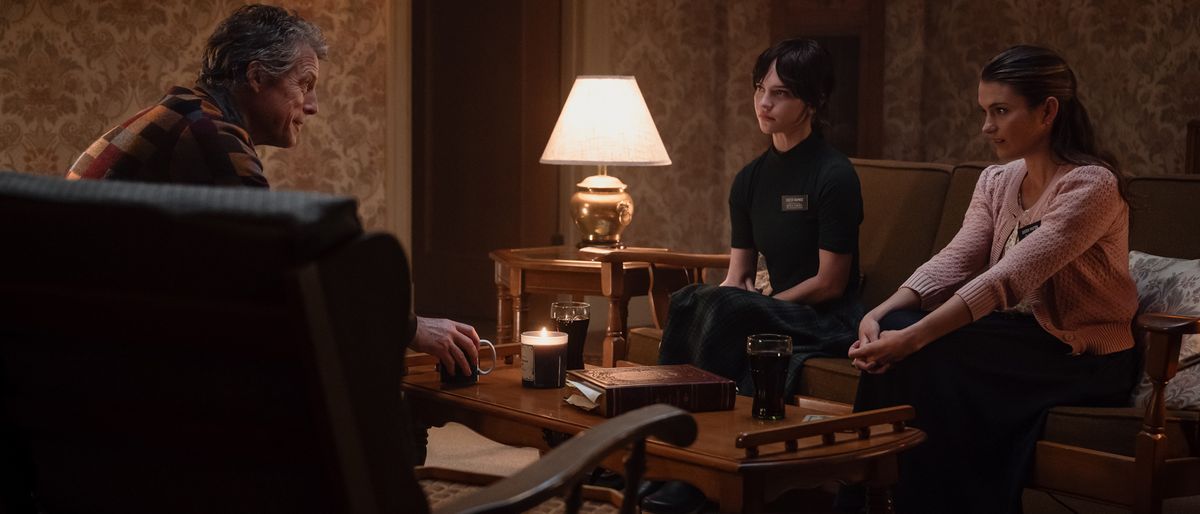
The Pitch Perfect aca-franchise is ending, you superior nerds. And sadly, the initially promising sequence went out on an overstuffed, off-tune whimper quite than a roar of sisterhood. The beloved Barden Bellas succumbed to the basic curse of the third installment.
Like many three-quels earlier than it—Spider-Man three, Little Fockers, The Fast and the Furious: Tokyo Drift, and so on.—the third Pitch Perfect went solely off the rails, largely because of a tenuous story from co-screenwriter Kay Cannon. Cannon, who additionally wrote the scripts for each the unique and Pitch Perfect 2, was apparently contemporary out of concepts right here: She throws a dozen drained tropes and weird diversions on the viewers, simply hoping one will stick. The motive individuals comply with these movies within the first place is the sense of feminine friendship, which was made an afterthought within the title of the finale being a big-budget blockbuster.
This 93-minute movie is kind of an overlong epilogue for the characters, mixed with a brief foray into motion comedy for Fat Amy in what looks like scenes from her straight-to-VHS spin-off. The film’s solely intelligent moments are callbacks that time out the franchise’s personal flaws, akin to everybody always ignoring Jessica and Ashley. (Who? Exactly.) Those moments may also be among the most cringeworthy. The movie virtually Fat Amy’s itself by stating its flaws earlier than you may—however generally that’s simply unhappy quite than humorous. Cannon mainly admits she was simply too lazy to write down a superb scene by having a personality bluntly lay out a whole situation, adopted by Flo saying, “That’s a lot of exposition!”
The remainder of the movie’s humor comes from characters saying awkward issues, then ready for the viewers to snigger from discomfort. Look, Aubrey is starved for affirmation! Amy is hypersexual! Chloe is overemotional! Lilly is bizarre! In these moments, the secondary characters really feel like they’ve devolved into caricatures of themselves (whereas a few of them had been caricatures to start with). The solely one that nonetheless comes throughout as charmingly quirky is Anna Kendrick’s Beca.
Thankfully, simply whenever you notice you haven’t laughed in an uncomfortably very long time, the movie supplies a a lot wanted break to let the women sing. Kendrick and Ester Dean shine within the Bellas’ cowl of “Cheap Thrills,” whereas the group’s efficiency of “Toxic” employs cool layered vocal sound results. The film’s solely good use of the Bellas being on tour with a bunch of bands is the riff-off. The in any other case wasted rival musicians, kind of led by everybody’s lady crush Ruby Rose, maintain the format attention-grabbing by mixing hip-hop, rock, and nation kinds, critically crushing the Bella’s absurd themes (akin to “zombie apocalypse songs”) by incorporating their devices. It’s “cheating” in line with the Bellas, however it’s an efficient strategy to combine up the riff-off method.
The new characters which can be launched right here (all the musicians, a army hunk, a dreamy producer, Amy’s dad) are nothing however two-dimensional stereotypes which can be speculated to wrap up free ends for the women, however are in the end simply filler. The Bellas don’t have time between flirting and country-hopping and combat scenes and explosions for any battle or progress between them. Their successes are all mainly handed to every of them, so the massive finale of everybody supporting each other is unearned and the closing quantity, George Michael’s “Freedom! ’90,” packs no actual emotional punch.
What will actually contact those that’ve been following the franchise is the behind-the-scenes footage that runs alongside the credit. It’s a montage of the Bellas from all three motion pictures goofing off on set and making reminiscences collectively. It’s candy and real and easy—the whole lot Pitch Perfect 3 isn’t. The Bellas’ bond and singing chops are sufficient for the movie to be bearable, however it’s not value watching until you’re already an enormous aca-fan who desires closure.
Source


